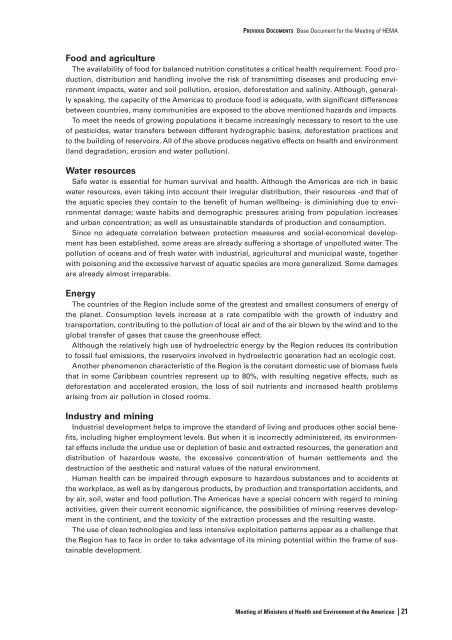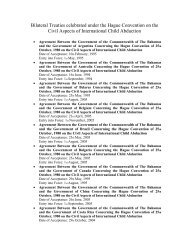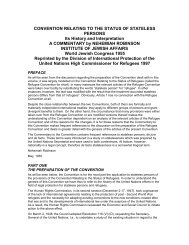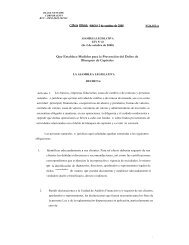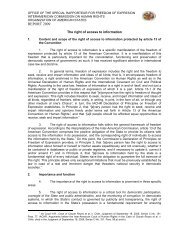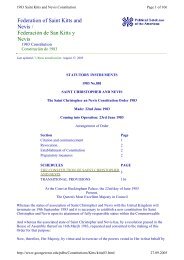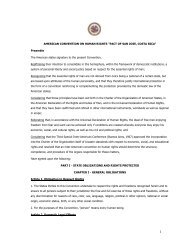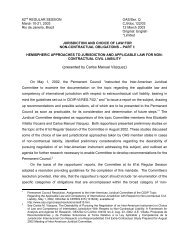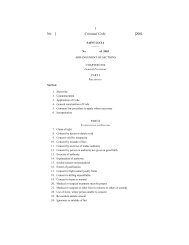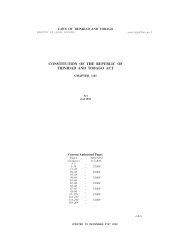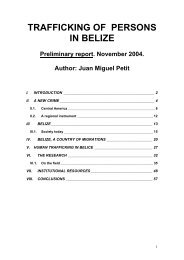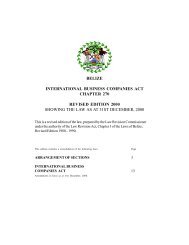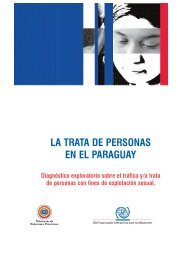(HEMA) Initiative. - OAS
(HEMA) Initiative. - OAS
(HEMA) Initiative. - OAS
Create successful ePaper yourself
Turn your PDF publications into a flip-book with our unique Google optimized e-Paper software.
PREVIOUS DOCUMENTS Base Document for the Meeting of <strong>HEMA</strong><br />
Food and agriculture<br />
The availability of food for balanced nutrition constitutes a critical health requirement. Food production,<br />
distribution and handling involve the risk of transmitting diseases and producing environment<br />
impacts, water and soil pollution, erosion, deforestation and salinity. Although, generally<br />
speaking, the capacity of the Americas to produce food is adequate, with significant differences<br />
between countries, many communities are exposed to the above mentioned hazards and impacts.<br />
To meet the needs of growing populations it became increasingly necessary to resort to the use<br />
of pesticides, water transfers between different hydrographic basins, deforestation practices and<br />
to the building of reservoirs. All of the above produces negative effects on health and environment<br />
(land degradation, erosion and water pollution).<br />
Water resources<br />
Safe water is essential for human survival and health. Although the Americas are rich in basic<br />
water resources, even taking into account their irregular distribution, their resources -and that of<br />
the aquatic species they contain to the benefit of human wellbeing- is diminishing due to environmental<br />
damage; waste habits and demographic pressures arising from population increases<br />
and urban concentration; as well as unsustainable standards of production and consumption.<br />
Since no adequate correlation between protection measures and social-economical development<br />
has been established, some areas are already suffering a shortage of unpolluted water. The<br />
pollution of oceans and of fresh water with industrial, agricultural and municipal waste, together<br />
with poisoning and the excessive harvest of aquatic species are more generalized. Some damages<br />
are already almost irreparable.<br />
Energy<br />
The countries of the Region include some of the greatest and smallest consumers of energy of<br />
the planet. Consumption levels increase at a rate compatible with the growth of industry and<br />
transportation, contributing to the pollution of local air and of the air blown by the wind and to the<br />
global transfer of gases that cause the greenhouse effect.<br />
Although the relatively high use of hydroelectric energy by the Region reduces its contribution<br />
to fossil fuel emissions, the reservoirs involved in hydroelectric generation had an ecologic cost.<br />
Another phenomenon characteristic of the Region is the constant domestic use of biomass fuels<br />
that in some Caribbean countries represent up to 80%, with resulting negative effects, such as<br />
deforestation and accelerated erosion, the loss of soil nutrients and increased health problems<br />
arising from air pollution in closed rooms.<br />
Industry and mining<br />
Industrial development helps to improve the standard of living and produces other social benefits,<br />
including higher employment levels. But when it is incorrectly administered, its environmental<br />
effects include the undue use or depletion of basic and extracted resources, the generation and<br />
distribution of hazardous waste, the excessive concentration of human settlements and the<br />
destruction of the aesthetic and natural values of the natural environment.<br />
Human health can be impaired through exposure to hazardous substances and to accidents at<br />
the workplace, as well as by dangerous products, by production and transportation accidents, and<br />
by air, soil, water and food pollution. The Americas have a special concern with regard to mining<br />
activities, given their current economic significance, the possibilities of mining reserves development<br />
in the continent, and the toxicity of the extraction processes and the resulting waste.<br />
The use of clean technologies and less intensive exploitation patterns appear as a challenge that<br />
the Region has to face in order to take advantage of its mining potential within the frame of sustainable<br />
development.<br />
Meeting of Ministers of Health and Environment of the Americas | 21


